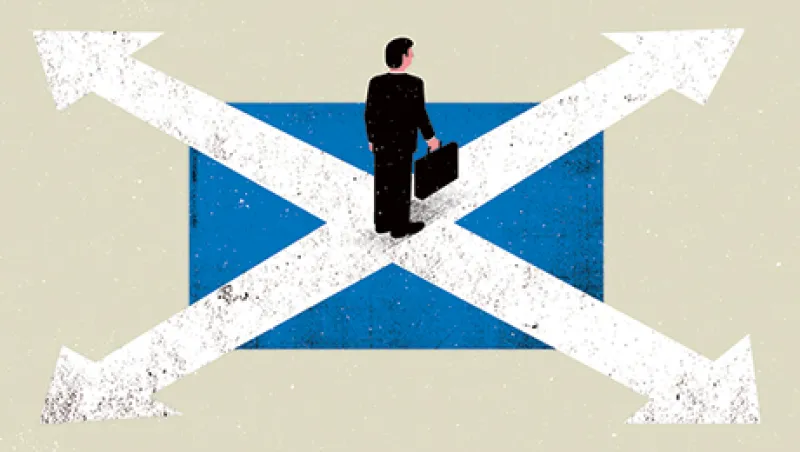Like a jaded spouse in a lengthy marriage, Scotland has mulled the idea of ending its union with England for much of the past three centuries. In its heart of hearts, England never really believed that Scotland would go its own way — nor did financial markets.
Suddenly, however, the idea of a sovereign divorce no longer seems fanciful. As Scots prepare to vote in a September 18 referendum on independence, there is genuine concern on both sides of the border that their verdict will be affirmative. Sterling fell sharply and yields on U.K. government bonds rose last week after a YouGov poll published on September 2 showed that support for a yes vote had surged to 47 percent, up from just 39 percent in early August. A further YouGov poll on September 7 showed support for independence at 51 percent, the first time any poll had shown the yes camp with a majority. Seeking to reverse the trend, on Sunday the government of Prime Minister David Cameron said it would draw up plans to give Scotland greater autonomy on tax and social welfare issues if voters rejected independence and chose to remain part of the U.K.
Analysts say the pound and gilts will be hit much harder if the yes camp carries the day, and that prices of many U.K. equities could suffer as well. A decision to break away from England, Wales and Northern Ireland would also pose a clear danger for Scotland’s large asset management industry, one of the jewels in the crown of the Scottish economy. The region is home to such firms as the £322 billion ($526 billion) Aberdeen Asset Management and Standard Life, the £254 billion-in-assets savings and investment group based in Edinburgh, as well as a host of investment trusts, or closed-end mutual funds.
If all they had to worry about was the long term, Scottish asset managers could take a sanguine view of independence. “I don’t think any asset manager with a Scottish jurisdiction will face any insurmountable barriers,” says a senior executive at one Scotland-based asset manager, who like most in the industry spoke on condition of anonymity. “After a period of time and adjustment, they will be able to carry on in the same way, or an extremely similar way, to the way they did when Scotland was part of the United Kingdom.”
He offers the example of Individual Savings Accounts, the tax-free investment accounts that are one of the most popular vehicles among U.K. retail investors. Under current law ISAs must be managed by U.K. companies. If the country splits, Scottish managers could set up subsidiaries in the remaining part of the U.K. (often referred to as rUK), or the rUK government in London could strike a deal with authorities in Edinburgh, the Scottish capital, to allow Scottish managers to continue to administer ISAs after independence.
What really worries this senior executive and many others is “the period of uncertainty between a yes vote and the completion of the process of independence.” Such a process, which even by the most optimistic estimates would take 18 months, will entail negotiations on a host of issues including tax and financial regulation. “People and markets do not like uncertainty, so attracting new clients and ensuring that existing clients stay with the business become increasingly challenging the longer a period of uncertainty goes on,” this executive says.
The yes campaign, which is led by the Scottish National Party and includes such prominent business figures as George Mathewson, former chairman of the Royal Bank of Scotland, asserts that separation negotiations could be completed by March 24, 2016. That’s the date that the Scottish regional government, led by the SNP, has proposed as the starting point for independence.
The U.K.’s three main national parties — the Conservative Party of Prime Minister David Cameron; its coalition partner, the Liberal Democrats; and the opposition Labour Party — as well as business leaders such as HSBC Holdings chairman Douglas Flint, a Scot, all oppose independence. Many in the no camp contend that the transition to an independent Scotland, and a smoothly running financial system, would take much longer than 18 months.
Owen Kelly, Edinburgh-based chief executive of Scottish Financial Enterprise, which represents the region’s financial services industry, believes it would take longer than two years. He cites the difficulty of building “a credible and respected regulator” from scratch. “Even the Financial Conduct Authority has observed how difficult it is to recruit good senior staff,” he says, referring to the new U.K. financial regulator that was set up in 2013.
A few firms have indicated they would be prepared to shift some of their business away from Scotland if they were worried about the consequences of independence. In February, Standard Life said that if anything “were to threaten” Scotland’s attractiveness as a base for the company, “we will take whatever action we consider necessary — including transferring parts of our operations from Scotland — in order to ensure continuity and to protect the interests of our stakeholders.” Alliance Trust, a Dundee-based investment and financial services company, has registered two companies in England as a precaution.
Companies have not indicated what concrete actions might cause them to flee the country. Financial services would represent about 11 percent of an independent Scotland’s economy, more than the current 8 percent or so for the U.K. as a whole. “I can’t think of a scenario where a future Scottish government would want to drive the financial services industry away from Scotland,” says the senior executive. Somewhat surprisingly, considering the size of the industry, the potential impact on financial services hasn’t figured prominently in the referendum debate, and Alex Salmond, the SNP leader and first minister of the Scottish government, has hardly said a word about the sector during the campaign.
Some analysts believe the Royal Bank of Scotland and other Scottish banks would flee south after a positive referendum because of fears that a Scottish government would not be able to fund them during a bank crisis. “The major banks might redomicile immediately to the U.K. under a ‘Yes’ vote,” analysts at Bank of America Merrill Lynch stated in a June research note on Scottish independence.
Other factors could also drive people and business away if Scotland votes yes. At the heart of this fear is the potential fiscal deficit of an independent Scotland. The region currently receives large net transfers from the U.K. budget. Azad Zangana, European economist at the London-based asset manager Schroders, estimates that an independent Scotland would have a deficit of between 8.3 and 14 percent of gross domestic product, depending on how Scotland and rUK would split North Sea oil and gas resources. To close the gap, Scotland would have to slash social welfare spending and raise taxes on individuals and companies, says Zangana, potentially driving them south of the border. “The fiscal deficit is going to be the key challenge for the government after the referendum,” he says. Salmond dismisses the fiscal fears, saying the deficit would be only 2.8 percent in the first year of independence.
Deficit concerns could also rebound against the remainder of the U.K. If North Sea oil and gas were split between Scotland and rUK along geographical lines, rUK would only get only about 10 percent, and the loss of energy production would widen its current-account deficit. “We’d be worried about the balance of payments if the current-account deficit rose from 4 percent of GDP now to 6 percent after independence, as it might if rUK lost most of the oil and gas, says Zangana. Such a shift could hit sterling and U.K. government bond yields, he adds.






